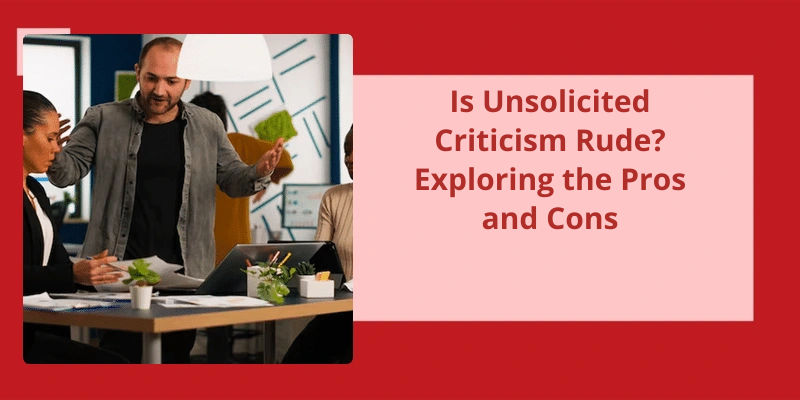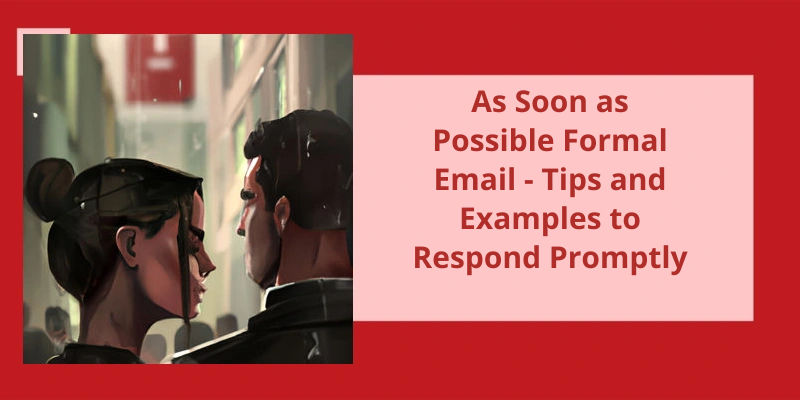Criticism is a delicate topic that can be difficult to navigate in any conversation. Unsolicited criticism, in particular, brings up questions about etiquette, respect, and social norms. While some may view it as a helpful contribution to a conversation or situation, others may find it intrusive, presumptive, and even harmful. Whether it’s in the workplace, personal relationships, or social settings, unsolicited criticism can leave the receiver feeling vulnerable, judged, and hurt. The question at hand is whether unsolicited criticism is inherently rude or if the act of giving advice without being asked is simply a misunderstood social norm that needs to be redefined.
Is Unsolicited Advice a Form Criticism?
The act of giving unsolicited advice can come across as a form of criticism, as it implies that the individual receiving the advice isn’t capable of making their own decisions or handling situations on their own. It can be seen as disrespectful and presumptive to insert ones ideas and opinions without being asked, especially in situations where the advice-giver may not have all the information or context needed to truly understand the situation at hand.
This can be problematic, as everyones experiences and perspectives are unique, and what may work for one person may not necessarily work for someone else. By assuming that ones advice is superior, the advice-giver may inadvertently dismiss or invalidate the thoughts and feelings of the individual receiving the advice.
However, even in these situations, it’s important to approach the situation with sensitivity and to listen to the needs and desires of the individual receiving the advice. It’s often best to ask if someone wants advice before giving it, or to offer support and a listening ear instead.
It’s important to approach situations with sensitivity and respect, and to prioritize listening and supporting others rather than assuming we know whats best for them.
The Psychological Effects of Unsolicited Advice on the Receiver
- Feeling annoyed or irritated
- Increase in stress levels
- Feeling belittled or disrespected
- Decrease in self-esteem
- Feeling like they aren’t capable of making decisions on their own
- Feeling misunderstood
- Feeling like their problems aren’t being taken seriously
- Increase in conflict or tension between individuals
- Feeling like they’re being judged
- Decrease in trust and confidence in the advice giver
While some people may believe that giving unsolicited advice is just a well-meaning gesture, others argue that it can actually be a form of passive aggression. This is especially true when it comes to personal topics such as weight, appearance, and emotions. Muñoz explains that comments like these can come across as patronizing and belittling, and may not actually be helpful to the recipient. So, is unsolicited advice really as harmless as it seems? Let’s take a closer look.
Is Unsolicited Advice Passive Aggressive?
People have different ways of expressing their opinions and giving advice, and not all of them are effective or appreciated. Unsolicited advice can be perceived as passive-aggressive, especially if the person giving it’s a hidden agenda or is trying to control the situation or the other person. Tone, intention, and context are important factors to consider when evaluating the impact of unsolicited advice.
Passive-aggressive behavior is characterized by indirect or subtle expressions of hostility, resentment, or frustration. Instead of confronting the issue directly, passive-aggressive people use sarcasm, irony, or manipulation to get their point across. For example, if someone says, “I love you just the way you are, but have you considered trying a new hairstyle?” they may be implying that they don’t actually love the person as they’re and that they want them to change.
Personal topics such as appearance, health, relationships, or career are often sensitive and private, and people may not appreciate unsolicited opinions or advice about them. Even if the advice is well-intentioned, it may come across as judgmental, intrusive, or dismissive of the other persons autonomy and choices. Muñozs example of suggesting weight loss or more sleep may seem harmless, but it can also be interpreted as fat-shaming or blaming the person for their tiredness, when there may be other factors at play.
Communication is a two-way street, and effective communication requires both parties to be willing to listen, understand, and respect each others perspectives. Unsolicited advice can be a barrier to effective communication, as it can create resentment, defensiveness, or conflict. Instead of assuming that the other person needs or wants your advice, it may be more helpful to ask them if they’d like to discuss the topic or if they’ve any questions or concerns. This approach shows that you value their input and aren’t trying to impose your views on them.
Finally, it’s important to recognize that everyone has the right to their own opinions and choices, and that unsolicited advice may not be appropriate or helpful in all situations. Sometimes people just need to vent, to be heard, or to figure things out on their own. By respecting their boundaries and autonomy, you show that you trust them to make their own decisions, even if they aren’t the ones you’d make. while unsolicited advice may not always be passive-aggressive, it can be perceived as such if it isn’t given with care, empathy, and respect.
The Psychological Reasons Behind Why Some People Give Unsolicited Advice
Unsolicited advice can be given by individuals who feel a need to be helpful or feel a strong sense of expertise in a particular area. Sometimes, it may stem from a desire to feel valued or respected by others. Additionally, some people may give unsolicited advice as a way of seeking validation or confirmation of their own beliefs and opinions. Overall, it often comes from a well-intentioned but misguided place.
Source: Passive-Aggressive Behavior: 11 Examples & How To Deal
Dealing with unsolicited advice can be a daunting task for many people. The struggle is mainly due to the fact that it can come from anyone, be it family, friends, or strangers. It’s important to know what counts as unsolicited advice and how to deal with it in a civil manner without ruining relationships.
What Counts as Unsolicited Advice?
Unsolicited advice can come from anyone, including family members, friends, coworkers, and even strangers. It can be given in various forms, such as verbal comments, written notes, or online messages. However, what distinguishes it from solicited advice is that it’s unsolicited, meaning the receiver didn’t ask for it and may not have welcomed it.
For example, imagine you’re struggling with a personal or work-related problem, and you confide in a friend about it. Instead of simply listening and providing support, your friend offers unsolicited advice on how to solve your problem. This advice may not be helpful, and it can make you feel like your friend isn’t really listening or understanding the situation.
For example, you may feel compelled to offer advice to someone who didn’t ask for it, thinking that you’re helping them. However, it’s essential to remember that not everyone wants or needs our advice. It’s always best to ask if the person wants your input or support before offering it.
One way to avoid offering unsolicited advice is to ask if your advice is welcome before sharing it. This can help ensure that your advice is received in a positive light and that you’re providing the best support possible to those who need it.
How to Politely Decline Unsolicited Advice
- Thank the person for their input
- Explain that you’ve already considered their advice
- Politely decline by saying something like, “I appreciate your concern, but I’ve decided to handle it differently”
- Redirect the conversation to another topic
- Express gratitude for their willingness to help
Nonviolent Communication (NVC) is an approach that aims to improve communication and relationships through empathy and nonviolence. According to NVC, unsolicited advice can be a form of violence, as it can be perceived as a way to impose one’s beliefs and values onto others and bully them into doing what we think is right. Let’s explore this idea further.
Is Unsolicited Advice a Form of Violence?
According to Nonviolent Communication (NVC), unsolicited advice is considered a form of violence. It can be compared to bullying, where one person tries to impose their views on another person forcibly. The use of unsolicited advice can be seen as disrespectful to individuals autonomy and can be harmful to their emotional well-being.
NVC believes that every individual has the right to make their own decisions and that imposition of ones will on someone else isn’t respectful or empathetic. It’s a fundamental principle of NVC to listen to others needs and empathize with them rather than forcing ones opinions and advice on them.
Providing unsolicited advice can also be counterproductive as it may lead to negative behavior, including resentment, anger, and frustration. It can create a communication gap between two people and reduce the potential for constructive dialogue.
Empathy helps to build trust and create a safe space where individuals can share their feelings and thoughts without any fear of judgment or criticism.
It can cause emotional harm and create communication gaps between people. It promotes mutual understanding, constructive dialogue, and respectful communication.
How to Effectively Communicate With and Support Someone Without Giving Unsolicited Advice.
- Listen actively and attentively to what the person is saying.
- Ask open-ended questions to encourage the person to share more about their experience.
- Acknowledge the person’s feelings and validate their experience.
- Offer empathy and compassion through nonverbal cues and body language.
- Resist the urge to jump in with solutions or advice unless asked.
- Offer support by simply being present and available.
- Encourage the person to seek professional help or guidance if necessary.
- Follow up with the person to check in and offer ongoing support.
- Respect the person’s autonomy and decision-making process.
Dealing with unsolicited criticism can be challenging, particularly when it feels like an attack or unwanted interference. While it’s natural to feel defensive, it’s also crucial to respond in a way that maintains your boundaries and personal values. In this article, we’ll explore some workable responses that can help you handle unsolicited criticism with grace and confidence. From acknowledging the message to honestly describing your feelings, these strategies can help shift your focus from the negative feedback and towards a more productive response.
How Do You Respond to Unsolicited Criticism?
Dealing with unsolicited criticism can be a frustrating and challenging experience for many people. It’s natural to feel defensive and upset when someone offers their unsolicited opinion. However, it’s essential to remember that there are constructive ways to respond to unsolicited criticism that can turn a negative experience into a positive one.
Another way to respond to unsolicited criticism is to take a step back and evaluate the intention behind the criticism. Is the criticism coming from a place of malice, or is the person genuinely trying to help? Understanding the intention behind the criticism can help you respond appropriately and find ways to address any underlying issues that may need improvement.
In some cases, it may be helpful to acknowledge the criticism and express your gratitude for their perspective. By doing so, you can create a productive dialogue and avoid engaging in an argument or getting defensive. It’s also essential to remember that not all criticism is valid, and it’s okay to disagree with someone elses opinion without feeling guilty.
Focus on your goals and values and surround yourself with people who support and encourage you. Remember that you’re in control of your life, and others opinions shouldn’t dictate your actions and decisions.
Conclusion
In conclusion, the act of providing unsolicited criticism can be considered rude, disrespectful, and presumptive. It can convey a sense of arrogance and superiority and can often do more harm than good. Unsolicited advice, particularly if it’s repetitive, can become nagging and communicate an unwarranted expectation of compliance. Rather than assuming one knows what’s best for someone else, it’s better to approach others with respect and humility and offer assistance only when asked for. Ultimately, it’s important to recognize that each person has their unique experiences and perspectives, and it isn’t always appropriate to impose one's own opinions and ideas.






